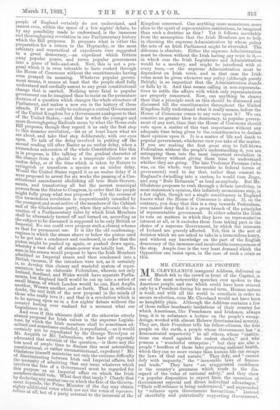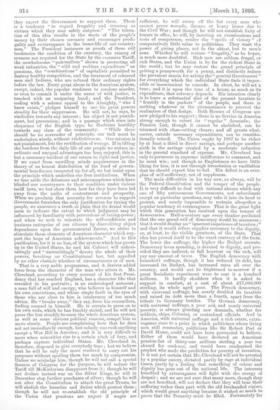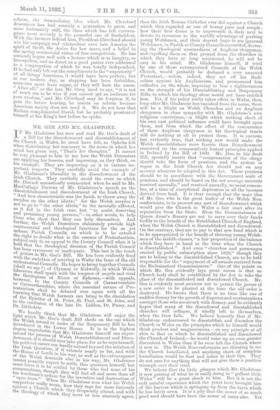MR. CLEVELAND AS PROPHET.
MR. CLEVELAND'S inaugural Address, delivered on March 4th to the crowd in front of the Capitol, is one of the most noteworthy speeches ever spoken to the American people, and one which could have been uttered only by a President during his second term. Human nature is weak, and with all the world to conciliate in order to secure re-election, even Mr. Cleveland would not have been so haughtily plain. Although the Address contains a few of those rather bombastic laudations of their country for which Americans, like Frenchmen and Irishmen, always long, it is in substance a lecture on the people's wrong- doings, worded with almost Hebrew directness and severity. They are, their President tells his fellow-citizens, the first people on the earth, a people whose Government has "a demonstrated superiority" to all others, whose "institu- tions can stand against the rudest shocks," and who possess a "wonderful enterprise ; " but they are also a people "heedless of those laws governing national health, which they can no more escape than human life can escape the laws of God and nature." They defy, and "cannot defy with impunity," the "inexorable laws of finance and trade." They have "an exaggerated confidence in the country's greatness which tends to the dis- regard of the rules of national safety," and they show "a popular disposition to expect from the operation of Government especial and direct individual advantages." "Their self-reliance is being undermined," and superseded by "reliance upon Government favouritism." Instead. of cheerfully and patriotically supporting Government, they expect the Government to support them. There is a tendency "to regard frugality and economy as virtues which they may safely outgrow." "The tolera- tion of this idea results in the waste of the people's money by their chosen servants and encourages prodi- gality and extravagance in the home-life of our country- men." The President instances as proofs of these evil tendencies the condition of the currency, the raising of revenue not required for the State by the excessive Tariff, the unwholesome " paternalism " shown in protecting all weak industries, the " wild and reckless expenditure pensions, the "combinations" of capitalists permitted to destroy healthy competition, and the treatment of coloured men and Indians, who are refused their ordinary rights before the law. Every great abuse in the American system, except, indeed, the popular readiness to condone murder, or even to commit it under the name of wild justice, is touched with an unsparing hand ; and the President, ending with a solemn appeal to the Almighty, "who I know exists," pledges himself to use his great powers steadily for their suppression. He will not, he says, be vindictive towards any interest ; his object is not punish- ment, but prevention; and in a passage which rises into eloquence of the English type, he disclaims hostility towards any class of the community. "While there should be no surrender of principle, our task must be undertaken wisely, without vindictiveness. Oar mission is not punishment, but the rectification of wrongs. If in lifting the .burdens from the daily life of our people we reduce in- ordinate and unequal advantages too long enjoyed, this is but a necessary incident of our return to right and justice. If we exact from unwilling minds acquiescence in the theory of an honest distribution of the fund of govern- mental beneficence treasured up for all, we but insist upon the principle which underlies our free institutions. When we tear aside the delusions and misconceptions which have blinded our countrymen to their condition under vicious tariff laws, we but show them how far they have been led away from the paths of contentment and prosperity. When we proclaim that necessity for revenue to support Government furnishes the only justification for taxing the people, we announce a truth so plain that its denial would seem to indicate the extent to which judgment may be influenced by familiarity with perversions of taxing-power ; and when we seek to reinstate the self-confidence and business enterprise of our citizens by discrediting abject dependence upon the governmental favour, we strive to stimulate those elements of American character which sup- port the hope of American achievements." And to this purification, for it is no less, of the system which has grown up in the United States, he and his Cabinet will unhesi- tatingly and " unremittingly " devote the whole of their powers, breaking no Constitutional law, but appalled by no other obstacle whether of circumstances or of men. That is a very noble programme, and it derives added force from the character of the man who utters it. Mr. Cleveland, according to every account of his first Presi- dency that has reached England, has a character like that revealed in his portraits ; is an undeveloped autocrat ; a man full of will and energy, who believes in himself and his own convictions, and whose single fault in the eyes of those who are close to him is intolerance of too much advice. He "breaks away," they say, from his counsellors, finding counsel in himself. He is certain to press on to his own ends, which he has frankly stated, and he will not press the less steadily because the whole American system, as well as some obvious political reasons, compel him to move slowly. People are complaining here that he does not act immediately enough, but nobody can rush anything except a War Bill in America; and it is very difficult to move when minorities rise to a certain pitch of fury, and perhaps capture individual States. Mr. Cleveland is, therefore, disposed to give everybody time ; but we believe that he will be only the more resolved to carry out his purposes without spoiling them too much by compromise. -Unless we misjudge him, though he will not call a special Session of Congress for the purpose, he will reduce the Tariff till McKinley ism disappears from it ; though he will not declare instant war on the Silver Kings, he will in December stop further purchases of silver ; though he will not alter the Constitution to attack the great Trusts, he will abolish the bounties and duties which protect them ; though he will not re-establish the old principle of the 'Union that pensions are unjust if wages are sufficient, he will sweep off the list every man who cannot prove wounds, disease, or heavy losses due to the Civil War ; and though he will not establish fixity of tenure in office, he will, by insisting on examinations and tests of competence, render the "spoils of victory" of comparatively little value to politicians. They want the power of giving places, not to the ablest, but to men's sons. Whether he will restore "frugality," as he hopes, is much more doubtful. Rich men are seldom frugal, or rich States, and. the Union is by far the richest State in the world ; but he may restore the grand principle of getting a pennyworth for a penny, and distinctly reduce the prevalent mania for asking the" general Government" for everything which the individual State finds it impos- sible or inconvenient to concede. In short, he will set a tone ; and it is upon the tone of a house, as much as its expenditure, that solvency depends. His intention clearly is to leave a substantial slice of the present taxation to "fructify in the pockets" of the people, and there is nothing whatever in the circumstances to prevent the realisation of that design. Both Houses of Congress are now pledged to his support ; there is no Service in America strong enough to extort its " regular " demands ; the Pension List, though it cannot be abolished, can be trimmed with close-cutting shears ; and all grants what- soever, outside necessary expenditures, can be constitu- tionally vetoed. The Union ought by 1897 to be richer by at least a third in direct savings, and perhaps another sixth in the savings ' created by a moderate reduction in the general standard of expense. Mr. Cleveland has only to persevere in supreme indifference to comment, and he must win ; and though as Englishmen we have little liking for him, it is not through irresolution or vacillation that we should expect him to fail. His defect is an over- plus of self-sufficiency, not of suppleness. The main difficulties in his way now, as always, will be the Federal Constitution and the temper of the people. It is very difficult to deal with national abuses which any one of fifty autonomous Governments, not subordinate except on particular questions, may take it into its bead to protect, and nearly impossible to restrain altogether a popular tendency to extravagance. That is the great light which this generation has received upon the temper of democracies. Half-a-century ago every thinker predicted that the one grand evil of democracy would be meanness ; that it would display an" ignorant impatience of taxation ;" and that it would refuse supplies necessary to the dignity, or, at least, to the visible greatness, of the State. That idea has proved itself to be the exact contrary of the facts. The lower the suffrage, the higher the Budget mounts.
Democracy loves spending, is devoted to dignity, and pro- vided they are indirect, or fall heaviest on the rich, will pay any amount of taxes. The English democracy with household suffrage, though it has reduced its debt, has increased its Budget, has increased rates all over the country, and would not be frightened to-morrow if a great Socialistic experiment were to cost it a hundred millions. It hardly shudders when it is asked to support in comfort, at a cost of about £17,000,000 sterling, its whole aged. poor. The French democracy, with universal suffrage, has nearly doubled its taxation and raised its debt more than a fourth, apart from the tribute to Germany besides. The German democracy, with universal suffrage, a poor soil, and nearly universal poverty, is always granting new demands, whether for soldiers, ships, Colonies, or centralised officials. And in America, with universal suffrage and a rich estate, extra- vagance rises to a point in which politicians whom living men still remember, politicians like Sir Robert Peel or David Hume, could not have been persuaded to believe. Either of them would have declared an American pension-list of thirty-one millions sterling a year too absurd for credence, and would have condemned the prophet who made the prediction for poverty of invention. It is not yet certain that Mr. Cleveland will not be arrested by a popular outcry, dictated partly by rage at individual losses, partly by a feeling that something of colour and dignity has gone out of the national life. The interests benefited by extravagance will fight with the energy of despair ; and we are not sure that many more, though they are not benefited, will not declare that they will bear their suffering rather than part with the old freehanded regime, which would grant anything because it wished so much to prove that the Treasury must be filled.. Fortunately for reform, the demoralising idea which Mr. Cleveland denounces has had scarcely a generation to grow, and more fortunately still, the class which has felt extrava- gance most severely is the powerful one of freeholders. With the farmers behind him, President Cleveland should win his campaign and reintroduce even into America the spirit of thrift, the desire for low taxes, and a belief in the saving commercial virtue of free competition. He has certainly begun well with a lecture which is as haughty, as free-spoken, and as direct as a good pastor ever addressed to a congregation of which he was totally independent. If, he had only left out the compliments to the " superiority" of all things American, it would have been perfect ; but in our modern day, as slapping has been forbidden, nurseries must have sugar, or they will hate the nurse. "After all," as the late Mr. Greg used to say, "it is not of much use to be wise if you cannot get an audience for your wisdom," and Mr. Cleveland may be forgiven if, to gain the better hearing, he insists on reform because American society does not need it. We do not hear that Nathan complimented David, but he probably prostrated himself at his King's feet before he spoke.




































 Previous page
Previous page